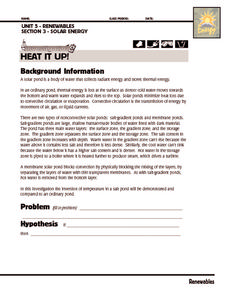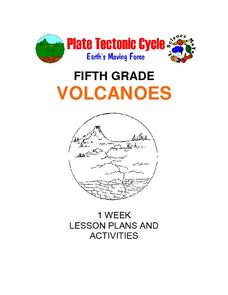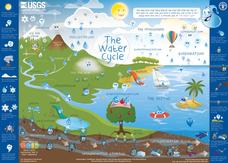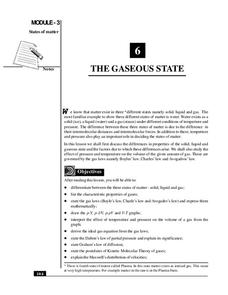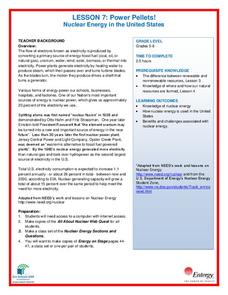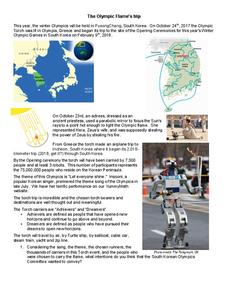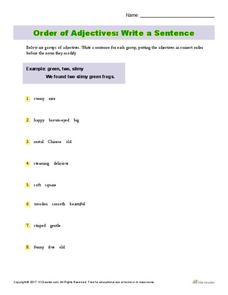Science Friday
Sublime Sublimation
Dry ice isn't dehydrated water, and young scientists learn why in this fascinating presentation. After watching a video, they complete three different activities using dry ice. Upon completion, they discuss the scientific principle.
Texas State Energy Conservation Office
Investigation: Heat it Up!
This demonstration of solar ponds can be used in an earth, environmental, or physical science setting. Lab groups set up a solar pond and model how it is able, due to a salt concentration gradient, to maintain heat for future use.
Texas State Energy Conservation Office
Investigation: Building a Parabolic-Trough Collector
Amateurs of alternative energy build a mini parabolic-trough solar energy collector and use it to heat water. Temperature is recorded over a three-minute period and the data is graphed and analyzed. Note that in order to paint aquarium...
Smarter Balanced
Effects of Water
To prepare for a performance task assessment, class members review the stages of the water cycle and then individuals assume the roles of drops of water for a Reader's Theater exercise. The script, a graphic depicting the water cycle,...
San Antonio Independent School District
Inventions and Innovation
What effect did innovations like the Bessemer Process, the light bulb, and the telephone have on the industrialization of the United States? Here is a nice graphic organizer that will help your young historians approach this question.
Warner Bros.
A Polar Express Word Search
All aboard The Polar Express! Use a word search to bring the magic of Chris Van Allsburg's sweet holiday story to your classroom. It features a picture from the book, as well as words and items from the story.
Utah Education Network (UEN)
Recipe Terminology Hunt
As your young learners develop into cooking enthusiasts, ensure their success in creating their next culinary masterpiece by preparing them to read and understand basic recipe terminology.
Utah Education Network (UEN)
Microwave Magic
The microwave is a staple in many American households, but how exactly does it work? Approach this question from a scientific and practical standpoint, and discover cooking strategies, recipes, and methodologies for the standard microwave.
Common Core Sheets
Reading a Timeline
Sometimes the most important details of an informational text aren't within the text at all. Teach your class how to read timeline with a set of activities that prompts them to find specific dates and events on the timelines, as well as...
It's About Time
Succession in Communities
What occurs following a natural disaster? High schoolers research this question and others as they investigate natural succession after a disaster. First, as they differentiate between primary and secondary succession, they explain how...
Curated OER
Volcanoes: Fourth Grade Lesson Plans and Activities
Young geologists begin exploring volcanoes of different structures and states: active, extinct, or dormant. During the lab, they make three models and compare different types of volcanoes, including composite, cinder cone, and shield....
Curated OER
Volcanoes: Fifth Grade Lesson Plans and Activities
Fifth graders explore volcanoes and the rocks they produce using the Internet. The lab portion of the lesson prompts young scientists to compare and describe igneous rocks. Next, they critique a pair or more of books on volcanoes in...
Mr. E. Science
Volcanoes
What is the difference between a shield volcano and a cinder cone volcano? How does the flow of lava influence the type of rock that's formed? A presentation on different aspects of volcanoes answers these questions for middle school...
It's About Time
Monitoring Active Volcanoes
The fastest growing volcano in recorded history grew more than 150 meters in less than a week and to more than 424 meters in less than a decade. How do we safely monitor active volcanoes? Young scientists design an instrument to measure...
Computer Science Unplugged
The Chocolate Factory–Human Interface Design
What is this? What is it for? How does it work? Challenge the class to think about to how to design a new chocolate factory for the Oompa-Loompas to make it easy to use. The activity is the first of a three-part series on computer-human...
Virginia Department of Education
Heat Transfer and Heat Capacity
It's time to increase the heat! Young chemists demonstrate heat transfer and heat capacity in an activity-packed lab, showing the transitions between solid, liquid, and gaseous phases of materials. Individuals plot data as the changes...
Curated OER
Using Rhythm Instruments to Tell a Story
After watching a video of Peter and the Wolf, and identifying the instruments used to represent each character, class members use rhythm instruments to represent the actions in the song, "What Would I do."
US Geological Survey
Water Cycle Poster
How many parts make up the water cycle? How many things on Earth rely on water as a system? Learn more about the water cycle in an informative and colorful poster. Print and hang, or project the graphic in the classroom for optimal use.
National Institute of Open Schooling
The Gaseous State
Sixth in a series of 36, this lesson focuses on gases and their behavior in given situations. Learners review the states of matter and then focus on gases, specifically learning Boyle's, Charles's, Avogadro's Laws, Dalton's, and Graham's...
National Wildlife Federation
Power Pellets! Nuclear Energy in the United States
Nuclear power provides about 20 percent of the energy generated in the United States. The seventh activity in the series of 12 tackles nuclear power. After sharing what they know about nuclear energy, scholars complete a WebQuest make a...
Prestwick House
To Kill a Mockingbird
Harper Lee's classic tale of Scout Finch's experience with prejudice and racism, To Kill a Mockingbird, provides the text for a 23-clue crossword puzzle.
Cornell University
Catapults
Ready, aim, fire! Launch to a new level of understanding as scholars build and test their own catapults. Learners explore lever design and how adjusting the fulcrum changes the outcome.
Yummy Math
The Olympic Flame's Trip
Just in time for the start of the Winter 2018 Olympics, you can track the Olympic torch relay through the Republic of Korea. But there must be some math involved, right? Give learners a worksheet that prompts them to calculate the...
K12 Reader
Order of Adjectives: Write a Sentence
Knowing the parts of speech can make you a better writer! Young grammarians use sets of two and three adjectives to write engaging sentences, taking care to use the adjectives in the correct order.
Other popular searches
- Steamboats
- The Steamboat
- Steamboat Activity
- Steam Shovel
- Steamboats Hudson River
- Steam Engines
- Impact of Steamboat
- Invention of the Steamboat
- Steamboat Travel
- Steamboat Invention
- Steam Locomotive
- Steam Engine Plans



